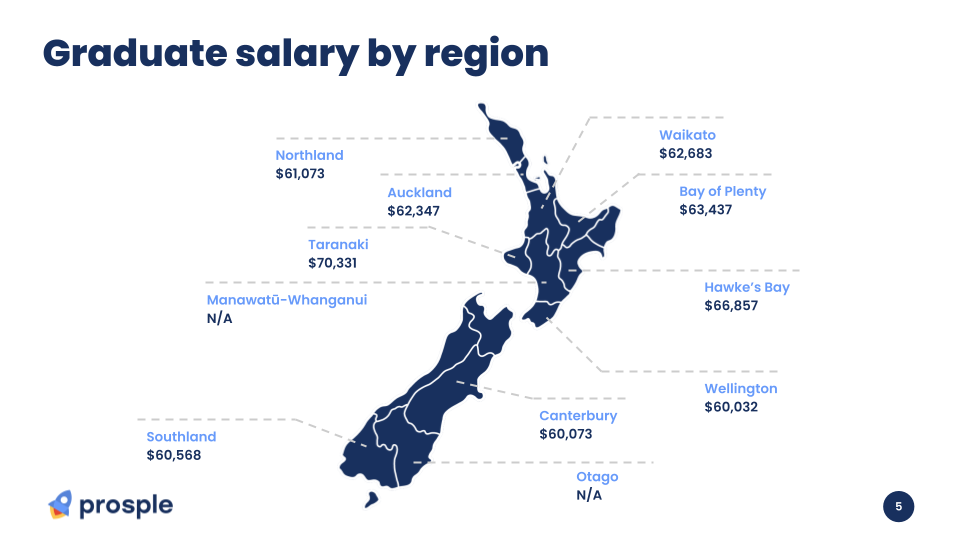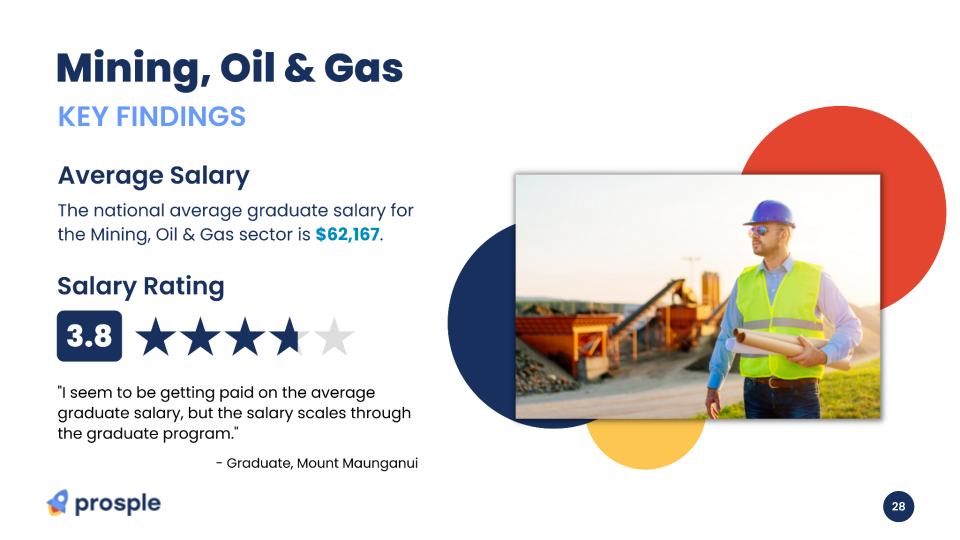What’s the Average Graduate Salary in New Zealand?
Team Prosple
Average graduate salaries in New Zealand
One of the best pieces of knowledge to have on hand during a job interview is the average graduate salary within your field. This allows you the opportunity to negotiate for the salary you deserve, as well as help guide the conversation on salary and benefit expectations. We’ve analyzed and assessed the data from our Prosple New Zealand database––which includes thousands of jobs across the country from hundreds of employers––to ensure you have the latest insights into what you can expect as a new graduate in terms of salary within New Zealand:
The average bachelor-degree salary in New Zealand is $64,600. Based on our data, the highest-paid sector for new graduates is Energy and Utilities, with the average salary of $73,953. Congrats if you fall into this sector, it’s only up from here! Some of the second highest paying industries are Engineering Consulting at $70,114, and R&D and Manufacturing at $66,909. The full list in ascending order is as follows:
- Construction & Property Services: $63,313
- Banking & Financial Services: $62,997
- Management Consulting: $62,559
- Mining, Oil & Gas: $62,167
- Technology: $61,824
- Government & Public Service: $60,720
- Transport & Logistics: $58,932
- Health: $58,825
- Retail, Sales & Consumer Goods: $56,230
- Accounting & Advisory: $56,105
- Environment & Agriculture: $52,767
- Law: $51,477
2023 average graduate salaries by province
Interestingly, the highest paid new grad jobs are not located in the more popular states of New Zealand. This is likely in an attempt to entice new workers to more remote areas. The region that offer the highest paid average graduate salary Taranaki at $70,331. If you’re willing to make the jump to a new state, it could be a major benefit to your long term salary prospects and potential career opportunities.
Urban vs. Rural Wages
A surprising factor to consider, especially for high-demand and high-paying jobs, is location. While the median salary remains similar across the board in more populated states, those who choose to move to more rural, remote areas may see a significant bump in starting salaries. In more rural areas, new grads can expect a starting salary of around $60,000, while larger metropolises are set closer to $55,000-$57,000. While that may not seem like much, the difference does add up over the years and starting with a higher salary allows you to leverage salary and experience in a new role down the line.
Gender, language, and other factors
While certain salary expectations can be anticipated for new grads, there are multiple external factors that contribute to salary ranges. The salary range can largely be affected by demographics, location and the local market. In some areas, particular jobs may be more competitive, as well as demand may be high for a specific skill or expertise. After analyzing certain data from Statistics New Zealand and Employment New Zealand, here are just a few aspects to keep in mind when it comes to salary ranges:
Gender
According to Employment New Zealand, many female workers across the country tend to work in occupations that are more than 80% female and these female-dominated occupations tend to be lower paid. Even in current times, women remain under-represented in higher-level jobs. But ultimately, both men and women’s working experience can be affected by gender. While women’s salary may be lower, men also often have less employment flexibility and are expected to climb the ladder within one company. In reference to Statistics New Zealand, there is currently a gender pay gap of 9.1 percent, remaining relatively unchanged over the past five years. 2021 saw an hourly earning increase for women by $0.80, while men saw an increase of $0.74.
Language and culture
To date, there remains a pay gap for those with a non-European background in New Zealand. Employed english-speaking European/Pākehā adults, on average, earn more than equivalently qualified non-European/non-Pākehā adults. This advantage increases with higher levels of qualification. Māori with higher tertiary qualifications earn around 10% less per hour than equivalently qualified European/Pākehā workers. The disadvantage is larger for Pacific peoples, and larger still for Asian and other groups.
Disability
Those with a reported disability are often under-represented in the workforce. Disabled people also tended to have lower earnings than non-disabled people. Median weekly earnings from wages and salaries for disabled people aged 15–64 years was $962, compared with $1,106 for non-disabled people in the same age group, a difference of $144 per week. The weekly pay disparity is partly explained by variation in hours, with disabled people often working part-time.
Average graduate salaries over time
According to the Ministry of Education, wages generally increase in New Zealand as you age and gain work experience, regardless of level of education. However, when compared to lower-level-educated adults, higher-level educated adults not only earn more, but their hourly earnings also grow at a faster rate. While in New Zealand there is a smaller wage gap between university-educated workers vs non-university educated workers, there is still a significant benefit to your long-term earning projections with a higher-education.
When it comes to how much more you can expect to make later in your career the figures are significant. Individuals with bachelor's degrees earn 2% above the national average wage one year after the study. That number jumps to 67% after ten years. So, it’s safe to assume that if you keep working hard you can expect a raise!
Finding out more about salaries at your target employer
Do you already have your heart set on a dream job at your dream company? Wondering what you can expect to earn with that specific employer? Prosple’s 2023 Graduate salary guide provides insight into the specifics of certain industry sectors, analyzing overall job and salary satisfaction. We asked our database of recent grads, so you’ll have the most up to date insights from your peers.
Based on our research, Banking & Financial Services saw the overall highest salary rating, receiving 4.4 out of 5, mentioning a great starting rate, as well as incentive structures.
Environment & Agriculture followed just behind in ranking a 4.4 out of 5. While the pay is based on career progression and additional working hours can result in even higher pay rates.
Third is the Mining, Oil & Gas sector with rating a 4.0 out of 5 in salary where salary scales through the grad program.
If you want even further insight into new graduate salary expectations, explore Prosple New Zealand’s Employer Database, which provides first-hand insight into base pay, as well as benefits and other perks on offer for new hires. You’ll also be rewarded with current employee reviews of their new grad experience at some of the most sought-after companies in New Zealand and across the globe. And don’t forget, check out the Prosple’s 2023 Graduate salary guide for NZ if you want the full detail on the latest graduate salaries!
Just remember, by knowing how much you can expect to be compensated for your experience, you’ll be in a better position to negotiate and land your dream job. We wish you a happy job hunting experience and if you need any further tips and tricks, Prosple New Zealand offers a wealth of knowledge to get you started on the right foot.
Popular searches
Accounting Graduate Jobs & Programmes
Government Graduate Jobs & Programmes
Engineering Graduate Jobs & Programmes
Information Technology (IT) Graduate Jobs & Programmes
Graduate Jobs & Programmes in Auckland
Graduate Jobs & Programmes in Christchurch
Graduate Jobs & Programmes in Wellington




